Pride and Prejudice
傲慢与偏见(英文版)

@ 宾利先生突然离开了简,伊莉莎白认为是达西先生造成的, 又更是讨厌达西先生了。
@ 两人在科林斯庄园相遇,达西先生决定向伊莉莎白告白.求
婚。然而…达西先生告白的态度,依旧不改他的傲慢,伊莉
莎白生气的向达西先生说:“you were the last man in the
world whom I could eve精r选b可e编p辑rpeptvailed on to marry."
精选可编辑ppt
24
At the second dancing party.Wickham,however,doesn’t come.
Darcy invites Elizabeth to dance
But…
精选可编辑ppt
25
She refuses!!!!!!!!
精选可编辑ppt
26
On a raining day…
• 达西先生:你是...你是在嘲笑我吗?
• Elizabeth Bennet: No. 伊丽莎白:不。
精选可编辑ppt
35
经典语录
• It is a truth universally acknowledged,that a single man in possession of a good fortune must be in want of a wife.
精选可编辑ppt
15
Elizabeth came home from outing
And…
精选可编辑ppt
16
The beginning
精选可编辑ppt
17
This is her house:
Longbourn !!
精选可编辑ppt
傲慢与偏见(共16张PPT)

• 附近小镇的民团联队里有个英俊潇洒的青年军官威克姆,人人都夸他 ,伊丽莎白也对他产生了好感。一天,他对伊丽莎白说,他父亲是 达西家的总管,达西的父亲曾在遗嘱中建议达西给他一笔财产,从 而体面地成为一名神职人员而这笔财产却被达西吞没了。伊丽莎白 听后,对达西更加反感。
•
• 柯林斯夫妇请伊丽莎白去他们家作客,伊丽莎白在那里遇到,并且被邀去她的 罗辛斯山庄做客。不久,又见到了来那里过复活节的达西。达西无法抑制自己
• 班纳特先生没有儿子,根据当时法律,只有男性可以继承财 产,而班纳特家的女儿们仅仅只能得到五千英镑作为嫁妆, 因此他的家产将由远亲柯林斯(Collins)继承。柯林斯古板平庸 又善于谄媚奉承,依靠权势当上了牧师。他向伊丽莎白求婚 ,遭拒绝后,马上与她的密友夏洛特(Charlotte)结婚,这也给 伊丽莎白带来不少烦恼。
作者简介
• 奥斯汀终身未婚,家道小康。由于居住在乡村小镇, 接触到的是中小地主、牧师等人物以及他们恬静、舒 适的生活环境,因此她的作品里没有重大的社会矛盾 。她以女性特有的细致入微的观察力,真实地描绘了 她周围世界的小天地,尤其是绅士淑女间的婚姻和爱 情风波。她的作品格调轻松诙谐,富有喜剧性冲突, 深受读者欢迎。在英国小说的发展史上有承上启下的 意义,被誉为地位“可与莎士比亚平起平坐”的作家。
傲慢与偏见
《傲慢与偏见》是简·奥斯汀的代表作。这部作品以 日常生活为素材,一反当时社会上流行的感伤小说的 内容和矫揉造作的写作方法,生动地反映了18世纪末 到19世纪初处于保守和闭塞状态下的英国乡镇生活 和世态人情。这部社会风情画式的小说不仅在当时 吸引着广大的读者,时至今日,仍给读者以独特的 艺术享受。 也有根据书本改编的电影.
先后两次求婚的不同态度,实际上反映了女性对人格独立和 平等权利的追求。这是伊丽莎白这一人物形象的进步意义。
Pride and Prejudice 傲慢与偏见 中英文双语简介

Pride and PrejudicePride and Prejudice is a novel by Jane Austen, first published in 1813. The story follows the main character Elizabeth Bennet as she deals with issues of manners, upbringing, morality, education, and marriage in the society of the landed gentry of early 19th-century England. Elizabeth is the second of five daughters of a country gentleman living near the fictional town of Meryton in Hertfordshire, near London. Though the story is set at the turn of the 19th century, it retains a fascination for modern readers, continuing near the top of lists of 'most loved books' such as The Big Read.[1] It has become one of the most popular novels in English literature and receives considerable attention from literary scholars. Modern interest in the book has resulted in a number of dramatic adaptations and an abundance of novels and stories imitating Austen's memorable characters or themes. To date, the book has sold some 20 million copies worldwidePlot summaryThe narrative opens with Mr Bingley, a wealthy, charming and social young bachelor, moving into Netherfield Park in the neighbourhood of the Bennet family. Mr Bingley is soon well received, while his friend Mr Darcy makes a less favorable first impression by appearing proud and condescending at a ball that they attend (this is partly explained in that he detests dancing and is not much for light conversation). Mr Bingley singles out Elizabeth's elder sister, Jane, for particular attention, and it soon becomes apparent that they have formed an attachment to each other. By contrast, Darcy slights Elizabeth, who overhears and jokes about it despite feeling a budding resentment.On paying a visit to Mr Bingley's sister, Jane is caught in a heavy downpour, catches cold, and is forced to stay at Netherfield for several days. Elizabeth arrives to nurse her sister and is thrown into frequent company with Mr Darcy, who begins to perceive his attachment to her, but is too proud to proceed on this feeling.Mr Collins, a clergyman, pays a visit to the Bennets. Mr Bennet and Elizabeth are much amused by his obsequious veneration of his employer, the noble Lady Catherine de Bourgh, as well as by his self-important and pedantic nature. It soon becomes apparent that Mr Collins has come to Longbourn to choose a wife from among the Bennet sisters (his cousins) and Elizabeth has been singled out. At the same time, Elizabeth forms an acquaintance with Mr Wickham, a militia officer who claims to have been very seriously mistreated by Mr Darcy, despite having been a ward of Mr Darcy's father. This tale, and Elizabeth's attraction to Mr Wickham, adds fuel to her dislike of Mr Darcy.At a ball given by Mr Bingley at Netherfield, Mr Darcy becomes aware of a general expectation that Mr Bingley and Jane will marry, and the Bennet family, with theexception of Jane and Elizabeth, make a public display of poor manners and decorum. The following morning, Mr Collins proposes marriage to Elizabeth, who refuses him, much to her mother's distress. Mr Collins recovers and promptly becomes engaged to Elizabeth's close friend Charlotte, a homely woman with few prospects. Mr Bingley abruptly quits Netherfield and returns to London, and Elizabeth is convinced that Mr Darcy and Mr Bingley's sister have conspired to separate him from Jane.In the spring, Elizabeth visits Charlotte and Mr Collins in Kent. Elizabeth and her hosts are frequently invited to Rosings Park, home of Lady Catherine de Bourgh, Darcy's aunt; coincidentally, Darcy also arrives to visit. Darcy again finds himself attracted to Elizabeth and impetuously proposes to her. Elizabeth, however, has just learned of Darcy's role in separating Mr Bingley from Jane from his cousin Colonel Fitzwilliam. She angrily rebukes him, and a heated discussion follows; she charges him with destroying her sister's happiness, with treating Mr Wickham disgracefully, and with having conducted himself towards her in an ungentleman-like manner. Mr Darcy, shocked, ultimately responds with a letter giving a good account of (most of) his actions: Wickham had exchanged his legacies for a cash payment, only to return after gambling away the money to reclaim the forfeited inheritance; he then attempted to elope with Darcy's young sister, thereby to capture her fortune. Regarding Mr Bingley and Jane, Darcy claimed he had observed no reciprocal interest in Jane for Bingley. Elizabeth later came to acknowledge the truth of Darcy's assertions.Some months later, Elizabeth and her Aunt and Uncle Gardiner visit Pemberley, Darcy's estate, believing he will be absent for the day. He returns unexpectedly, and though surprised, he is gracious and welcoming. He treats the Gardiners with great civility; he introduces Elizabeth to his sister, and Elizabeth begins to realise her attraction to him. Their reacquaintance is cut short, however, by news that Lydia, Elizabeth's sister, has run away to elope with Mr Wickham. Elizabeth and the Gardiners return to Longbourn, where Elizabeth grieves that her renewed acquaintance with Mr Darcy will end because of her sister's disgrace.Lydia and Wickham are soon found, then married by the clergy; they visit Longbourn, where Lydia lets slip that Mr Darcy was responsible for finding the couple and negotiating their marriage—at great expense to himself. Elizabeth is shocked but does not dwell further on the topic due to Mr Bingley's return and subsequent proposal to Jane, who immediately accepts.Lady Catherine de Bourgh later bursts in on Longbourn; intending to thwart local rumour, she warns Elizabeth against marrying Mr Darcy. Elizabeth refuses her demands. Disgusted, Lady Catherine leaves and drops by to inform her nephew on Elizabeth's abominable behaviour. However, this lends hope to Darcy that Elizabeth's opinion of him may have changed. He travels to Longbourn and proposes again; and now Elizabeth accepts.Major themesMany critics take the novel's title as a starting point when analysing the major themes of Pride and Prejudice; however, Robert Fox cautions against reading too much into the title because commercial factors may have played a role in its selection. "After the success of Sense and Sensibility, nothing would have seemed more natural than to bring out another novel of the same author using again the formula of antithesis and alliteration for the title. It should be pointed out that the qualities of the title are not exclusively assigned to one or the other of the protagonists; both Elizabeth and Darcy display pride and prejudice."[5]A major theme in much of Austen's work is the importance of environment and upbringing on the development of young people's character and morality.[6] Social standing and wealth are not necessarily advantages in her world, and a further theme common to Jane Austen's work is ineffectual parents. In Pride and Prejudice, the failure of Mr and Mrs Bennet as parents is blamed for Lydia's lack of moral judgment; Darcy, on the other hand, has been taught to be principled and scrupulously honourable, but he is also proud and overbearing.[6] Kitty, rescued from Lydia's bad influence and spending more time with her older sisters after they marry, is said to improve greatly in their superior society内容简介说故事最主要是围绕着18世纪末19世纪初,英国地主乡绅贵族的求爱和婚姻问题。
Pride-and-Prejudice-傲慢与偏见中英文双语简介
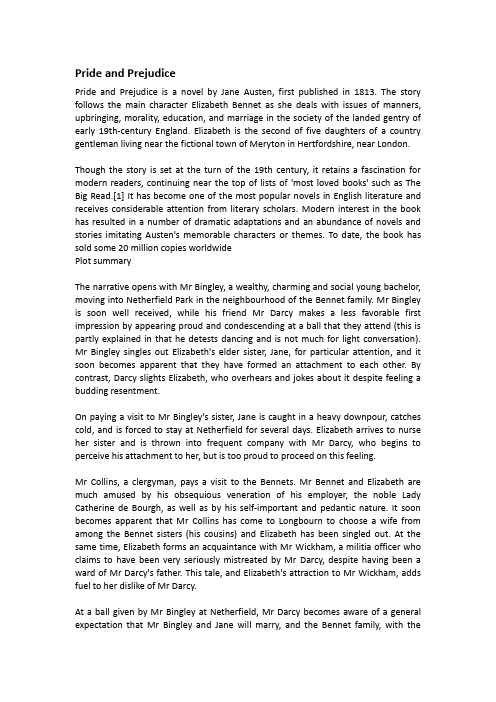
Pride and PrejudicePride and Prejudice is a novel by Jane Austen, first published in 1813. The story follows the main character Elizabeth Bennet as she deals with issues of manners, upbringing, morality, education, and marriage in the society of the landed gentry of early 19th-century England. Elizabeth is the second of five daughters of a country gentleman living near the fictional town of Meryton in Hertfordshire, near London. Though the story is set at the turn of the 19th century, it retains a fascination for modern readers, continuing near the top of lists of 'most loved books' such as The Big Read.[1] It has become one of the most popular novels in English literature and receives considerable attention from literary scholars. Modern interest in the book has resulted in a number of dramatic adaptations and an abundance of novels and stories imitating Austen's memorable characters or themes. To date, the book has sold some 20 million copies worldwidePlot summaryThe narrative opens with Mr Bingley, a wealthy, charming and social young bachelor, moving into Netherfield Park in the neighbourhood of the Bennet family. Mr Bingley is soon well received, while his friend Mr Darcy makes a less favorable first impression by appearing proud and condescending at a ball that they attend (this is partly explained in that he detests dancing and is not much for light conversation). Mr Bingley singles out Elizabeth's elder sister, Jane, for particular attention, and it soon becomes apparent that they have formed an attachment to each other. By contrast, Darcy slights Elizabeth, who overhears and jokes about it despite feeling a budding resentment.On paying a visit to Mr Bingley's sister, Jane is caught in a heavy downpour, catches cold, and is forced to stay at Netherfield for several days. Elizabeth arrives to nurse her sister and is thrown into frequent company with Mr Darcy, who begins to perceive his attachment to her, but is too proud to proceed on this feeling.Mr Collins, a clergyman, pays a visit to the Bennets. Mr Bennet and Elizabeth are much amused by his obsequious veneration of his employer, the noble Lady Catherine de Bourgh, as well as by his self-important and pedantic nature. It soon becomes apparent that Mr Collins has come to Longbourn to choose a wife from among the Bennet sisters (his cousins) and Elizabeth has been singled out. At the same time, Elizabeth forms an acquaintance with Mr Wickham, a militia officer who claims to have been very seriously mistreated by Mr Darcy, despite having been a ward of Mr Darcy's father. This tale, and Elizabeth's attraction to Mr Wickham, adds fuel to her dislike of Mr Darcy.At a ball given by Mr Bingley at Netherfield, Mr Darcy becomes aware of a general expectation that Mr Bingley and Jane will marry, and the Bennet family, with theexception of Jane and Elizabeth, make a public display of poor manners and decorum. The following morning, Mr Collins proposes marriage to Elizabeth, who refuses him, much to her mother's distress. Mr Collins recovers and promptly becomes engaged to Elizabeth's close friend Charlotte, a homely woman with few prospects. Mr Bingley abruptly quits Netherfield and returns to London, and Elizabeth is convinced that Mr Darcy and Mr Bingley's sister have conspired to separate him from Jane.In the spring, Elizabeth visits Charlotte and Mr Collins in Kent. Elizabeth and her hosts are frequently invited to Rosings Park, home of Lady Catherine de Bourgh, Darcy's aunt; coincidentally, Darcy also arrives to visit. Darcy again finds himself attracted to Elizabeth and impetuously proposes to her. Elizabeth, however, has just learned of Darcy's role in separating Mr Bingley from Jane from his cousin Colonel Fitzwilliam. She angrily rebukes him, and a heated discussion follows; she charges him with destroying her sister's happiness, with treating Mr Wickham disgracefully, and with having conducted himself towards her in an ungentleman-like manner. Mr Darcy, shocked, ultimately responds with a letter giving a good account of (most of) his actions: Wickham had exchanged his legacies for a cash payment, only to return after gambling away the money to reclaim the forfeited inheritance; he then attempted to elope with Darcy's young sister, thereby to capture her fortune. Regarding Mr Bingley and Jane, Darcy claimed he had observed no reciprocal interest in Jane for Bingley. Elizabeth later came to acknowledge the truth of Darcy's assertions.Some months later, Elizabeth and her Aunt and Uncle Gardiner visit Pemberley, Darcy's estate, believing he will be absent for the day. He returns unexpectedly, and though surprised, he is gracious and welcoming. He treats the Gardiners with great civility; he introduces Elizabeth to his sister, and Elizabeth begins to realise her attraction to him. Their reacquaintance is cut short, however, by news that Lydia, Elizabeth's sister, has run away to elope with Mr Wickham. Elizabeth and the Gardiners return to Longbourn, where Elizabeth grieves that her renewed acquaintance with Mr Darcy will end because of her sister's disgrace.Lydia and Wickham are soon found, then married by the clergy; they visit Longbourn, where Lydia lets slip that Mr Darcy was responsible for finding the couple and negotiating their marriage—at great expense to himself. Elizabeth is shocked but does not dwell further on the topic due to Mr Bingley's return and subsequent proposal to Jane, who immediately accepts.Lady Catherine de Bourgh later bursts in on Longbourn; intending to thwart local rumour, she warns Elizabeth against marrying Mr Darcy. Elizabeth refuses her demands. Disgusted, Lady Catherine leaves and drops by to inform her nephew on Elizabeth's abominable behaviour. However, this lends hope to Darcy that Elizabeth's opinion of him may have changed. He travels to Longbourn and proposes again; and now Elizabeth accepts.Major themesMany critics take the novel's title as a starting point when analysing the major themes of Pride and Prejudice; however, Robert Fox cautions against reading too much into the title because commercial factors may have played a role in its selection. "After the success of Sense and Sensibility, nothing would have seemed more natural than to bring out another novel of the same author using again the formula of antithesis and alliteration for the title. It should be pointed out that the qualities of the title are not exclusively assigned to one or the other of the protagonists; both Elizabeth and Darcy display pride and prejudice."[5]A major theme in much of Austen's work is the importance of environment and upbringing on the development of young people's character and morality.[6] Social standing and wealth are not necessarily advantages in her world, and a further theme common to Jane Austen's work is ineffectual parents. In Pride and Prejudice, the failure of Mr and Mrs Bennet as parents is blamed for Lydia's lack of moral judgment; Darcy, on the other hand, has been taught to be principled and scrupulously honourable, but he is also proud and overbearing.[6] Kitty, rescued from Lydia's bad influence and spending more time with her older sisters after they marry, is said to improve greatly in their superior society内容简介说故事最主要是围绕着18世纪末19世纪初,英国地主乡绅贵族的求爱和婚姻问题。
傲慢与偏见(Pride and Prejudice)中英文对照

..that the whole party will have left Netherfield by now, for London.
And without any intention of coming back again.
而且不打算再回来
(MISS BINGLEY): Charles first thought that his business in London Would only take a feW days,
傲慢与偏见 Pride and Prejudice BBC版本 中英文剧本3
Lizzy! Jane!
丽西,瑾
What do you think? Mr Collins has made an offer of marriage to Charlotte Lucas!
你们说呢? 科林斯先生 跟夏洛蒂洛克斯求婚了
但她无法说服坠入情网的人 相信自己爱的是别人
If Bingley is not back by your side and dining at Longbourn within two weeks,
若宾莱先生两周内 没回你身边到龙柏园晚餐
I shall be very much surprised.
我衷心渴望这一件 会让许多人都幸福的事
in indulging the hope of an event Which Would secure the happiness of so many?
Is it not clear enough?
这还不够清楚吗?
Caroline Bingley believes her brother is indifferent to me and she means to put me on my guard.
傲慢与偏见
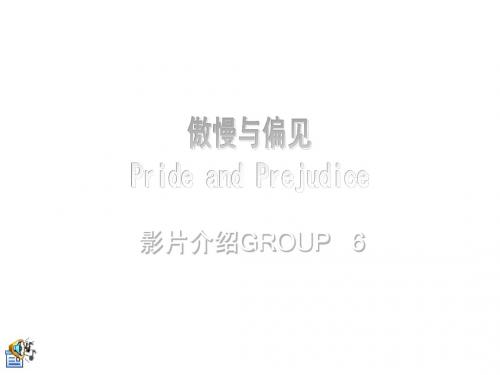
剧情简介
班纳特太太最大的人生目标就是给她的五个女儿找到 如意郎君。可惜天不从人愿,二女儿伊丽莎白偏能找 出100个不愿结婚的理由。 100个不愿结婚的理由。 The biggest goal in life of Mrs. Bennet is to find Mr. Right for her five daughters . Unfortunately, Heaven declines to accept people's wish, the second daughter, Elizabeth, partial to find out 100 reasons not to get married.
简·奥斯汀
•
她20岁左右开始写作,共发表了6部长篇小说。1811年出版的《理智与情感》是她的 20岁左右开始写作 共发表了6部长篇小说。1811年出版的 理智与情感》 岁左右开始写作, 年出版的《 处女作,随后又接连发表了《傲慢与偏见》(1813)、《曼斯菲尔德花园》(1814) )、《 处女作,随后又接连发表了《傲慢与偏见》 1813)、 曼斯菲尔德花园》 1814) 和《爱玛》(也译《艾玛》)(1815)。《诺桑觉寺》(又名《诺桑觉修道院》)和 爱玛》 也译《艾玛》)(1815)。 诺桑觉寺》 又名《诺桑觉修道院》 )。《 《劝导》(1818)是在她去世后第二年发表的,并署上了作者真名。 劝导》 1818)是在她去世后第二年发表的,并署上了作者真名。
影片介绍GROUP 影片介绍GROUP 6
《傲慢与偏见》英文名为Pride 《傲慢与偏见》英文名为Pride and Prejudice, Prejudice, 这部电影改编于著名英国女作家简· 这部电影改编于著名英国女作家简·奥斯汀的 代表作《傲慢与偏见》 《傲慢与偏见》 in English called Pride
Pride and prejudice英文介绍
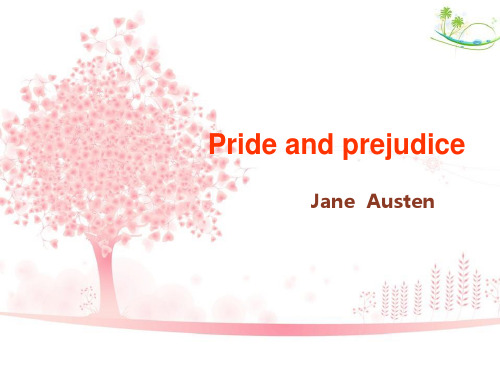
• Mr.Bingley is newly from London and fall in love with the big daughter ,Jan ,who is gentle and beautiful
The marriage between Jane Bennet and Bingley is an example of successful marriage.
• 对这个世界看得越多 我就越不满
.After a range of interesting troubles,the misunderstanding is finally removed .With Darcy overcomes his pride ,and Elizabeth her prejudice ,they get together with each other finally
有些人即使没有存心做坏事可事实有些人即使没有存心做坏事可事实上事情仍会做错引起不幸的后果
Pride and prejudice
Jane Austen
•It is a truth well known to all the world that an unmarried man in possession of a large fortune must in need of a wife ----------- Pride and
• This is the power of love. loves This is the power of love. loves
can really create miracles.
can really create miracles.
• .If two people are meant to be
傲慢与偏见-Pride,and,Prejudice-有声英语名著
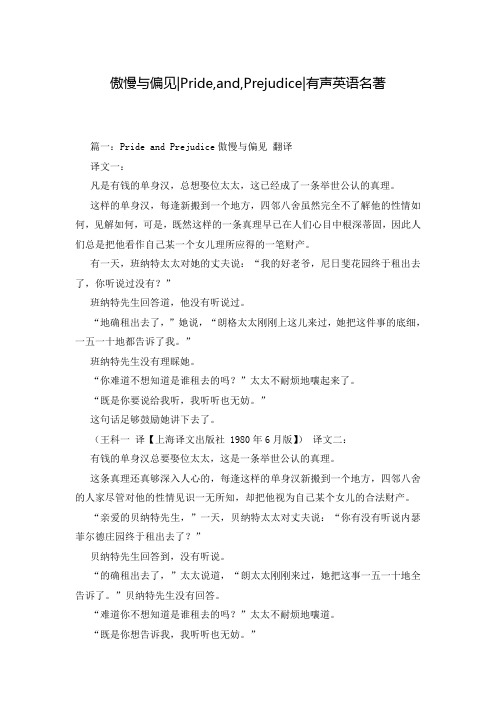
傲慢与偏见|Pride,and,Prejudice|有声英语名著篇一:Pride and Prejudice傲慢与偏见翻译译文一:凡是有钱的单身汉,总想娶位太太,这已经成了一条举世公认的真理。
这样的单身汉,每逢新搬到一个地方,四邻八舍虽然完全不了解他的性情如何,见解如何,可是,既然这样的一条真理早已在人们心目中根深蒂固,因此人们总是把他看作自己某一个女儿理所应得的一笔财产。
有一天,班纳特太太对她的丈夫说:“我的好老爷,尼日斐花园终于租出去了,你听说过没有?”班纳特先生回答道,他没有听说过。
“地确租出去了,”她说,“朗格太太刚刚上这儿来过,她把这件事的底细,一五一十地都告诉了我。
”班纳特先生没有理睬她。
“你难道不想知道是谁租去的吗?”太太不耐烦地嚷起来了。
“既是你要说给我听,我听听也无妨。
”这句话足够鼓励她讲下去了。
(王科一译【上海译文出版社 1980年6月版】)译文二:有钱的单身汉总要娶位太太,这是一条举世公认的真理。
这条真理还真够深入人心的,每逢这样的单身汉新搬到一个地方,四邻八舍的人家尽管对他的性情见识一无所知,却把他视为自己某个女儿的合法财产。
“亲爱的贝纳特先生,”一天,贝纳特太太对丈夫说:“你有没有听说内瑟菲尔德庄园终于租出去了?”贝纳特先生回答到,没有听说。
“的确租出去了,”太太说道,“朗太太刚刚来过,她把这事一五一十地全告诉了。
”贝纳特先生没有回答。
“难道你不想知道是谁租去的吗?”太太不耐烦地嚷道。
“既是你想告诉我,我听听也无妨。
”这句话足以逗引太太讲下去。
(孙致礼译【译林出版社 1990年7月版】)篇二:傲慢与偏见(PrideAndPrejudice)英文读后感傲慢与偏见(Pride And Prejudice)英文读后感The feeling of 《Pride And Prejudice》Then man treat great event in one’s life with punishing, Demonstrate different attitudes to the love question of the marriage of young girl of the family origin of middle class of villages and towns, Thus reflected authors oneself’s marriage view: It is wrong to get married for the property, money and position; Get married and does not consider that above-mentioned factors are unwise too . So, she objects to getting married for money , objecting to regarding the marriage as a trifling matter . She emphasizes the importance of the ideal marriage , and regard men and women’s emotion as the foundation stone which concludes the ideal marriage .The woman protagonist in the book Elizabeth comes from the little landlord’s family, reaches the west to have deep love for for the rich and powerful people sons and younger brothers. Reach thedisparity of ignoring family status and wealth of the west, propose to her, but is refused. Elizabeth’s misunderstanding and prejudice to him are a reason, but a main one is the arrogance that she dislikes him. Reach the thes of the west in fact status’ the reflections of difference, exist this kind arrogant, Not having common thoughts and feelings between he and Elizabeth, the marriage that can not have lofty ideals . Elizabeth watches conducting oneselfin society and a series of behavior of reaching the west personally afterwards, See he change the proud conceited expressions of passing by, dispel misunderstanding and prejudice to him, Thus concluded the happymarriage with him.篇三:[傲慢与偏见].Pride.and.Prejudice.200585001:08:44,547 -- 01:08:46,174伊丽莎白小姐Miss Elizabeth.85101:08:46,341 -- 01:08:48,968我实在没有办法撑下去了I have struggled in vain and can bear it no longer.85201:08:49,135 -- 01:08:51,297这几个月对于我来说是一种折磨These past months have been a torment.85301:08:51,298 -- 01:08:53,306我来罗新斯只是为了见你I came to Rosings only to see you.85401:08:53,473 -- 01:08:56,643理智的想法和家族的期望阻挠着我I have fought against judgement, my family’s expectation, 85501:08:56,851 -- 01:08:59,687你卑微的出身和我爵位的悬殊也令我迟疑不决the inferiority of your birth, my rank.85601:08:59,854 -- 01:09:02,482但我要把这一切统统抛开,请你终结我的痛苦I will put them aside and ask you to end my agony.85701:09:02,649 -- 01:09:05,818- 我不明白你在说什么 - 我爱你- I don’t understand. - I love you.85801:09:07,946 -- 01:09:10,323最真挚的爱Most ardently.85901:09:13,326 -- 01:09:17,497请赐予我荣幸,接受我的手吧Please do me the honour of accepting my hand.86001:09:18,915 -- 01:09:22,835先生,我感激你的挣扎Sir, I appreciate the struggle you have been through, 86101:09:23,044 -- 01:09:25,588很抱歉引起你的痛苦and I am very sorry to have caused you pain.86201:09:25,797 -- 01:09:27,840我完全是无心的It was unconsciously done.86301:09:29,258 -- 01:09:31,052- 这就是你的回复? - 是的,先生- Is this your reply? - Yes, sir.86401:09:31,219 -- 01:09:33,930- 你是在嘲笑我吗? - 不- Are you laughing at me? - No.86501:09:34,097 -- 01:09:35,264你是在拒绝我?Are you rejecting me?86601:09:35,473 -- 01:09:41,020我确信,你心中阶级的门槛会帮助你克服痛苦I’m sure the feelings which hindered your regard will help you overcome it.86701:09:41,187 -- 01:09:44,357我能否问问,为什么我竟会遭受如此无礼的拒绝?Might I ask why with so little civility I am thus repulsed?86801:09:44,565 -- 01:09:45,868那么我能否问问I might enquire86901:09:45,869 -- 01:09:49,779为什么你说喜欢我是违背了你自己的理智?why you told me you liked me against your better judgement?87001:09:49,946 -- 01:09:50,683若说我是无礼的If I was uncivil,87101:09:50,684 -- 01:09:52,240那这就是我无礼的理由之一吧then that is some excuse.87201:09:52,407 -- 01:09:55,410- 但我还有别的理由 - 什么理由?- But you know I have other reasons. - What reasons?87301:09:55,576 -- 01:09:59,163一个毁了我最亲爱的姐姐幸福的人Do you think anything might tempt me to accept the man who has ruined 87401:09:59,330 -- 01:10:02,500怎么会打动我的心去爱他呢?the happiness of a most beloved sister?87501:10:02,667 -- 01:10:07,380你能否认你拆散了一对相爱的恋人Do you deny that you separated a young couple who loved each other, 87601:10:07,547 -- 01:10:09,924让你的朋友被大家指责为朝三暮四exposing your friend to censure for caprice87701:10:10,091 -- 01:10:12,927让我的姐姐被大家嘲笑为奢望空想and my sister to derision for disappointed hopes,87801:10:13,094 -- 01:10:15,138让他们双方都受尽了痛苦?involving them both in acute misery?87901:10:15,346 -- 01:10:18,766- 我并不否认 - 你怎么能做出这样的事情? - I do not deny it. - How could you do it?88001:10:18,933 -- 01:10:21,811我认为你姐姐觉得他无关紧要I believed your sister indifferent to him.88101:10:21,978 -- 01:10:24,647我觉得他的爱要比她更多I realised his attachment was deeper than hers.88201:10:24,814 -- 01:10:25,815那是因为她害羞!That’s because she’s shy!88301:10:26,023 -- 01:10:28,651我说服彬格莱认为,她的感觉并不强烈Bingley was persuaded she didn’t feel strongly.88401:10:28,818 -- 01:10:30,862- 那都是你说的 - 我这样做是为了他好- Because you suggested it. - For his own good.88501:10:31,028 -- 01:10:33,865我姐姐连对我都不吐露她的心声My sister hardly shows her true feelings to me.88601:10:38,077 -- 01:10:40,621我想你是担心她是看上了他的钱吧? I suppose his fortune had some bearing?88701:10:40,830 -- 01:10:43,374我无意使你姐姐难堪I wouldn’t do your sister the dishonour.88801:10:43,541 -- 01:10:45,585- 有迹象表明... - 什么?- It was suggested... - What was?88901:10:45,751 -- 01:10:48,212这门婚事明显是为了谋取利益的... It was clear an advantageous marriage...89001:10:48,379 -- 01:10:50,756- 我姐姐给你那种印象? - 不!- Did my sister give that impression? - No!89101:10:50,965 -- 01:10:53,601你姐姐没有, 然而你的家人...No. There was, however, your family...89201:10:53,602 -- 01:10:55,052你以为我们是为了攀高枝?Our want of connection?89301:10:55,219 -- 01:10:57,680- 不,比那更甚 - 怎样更甚,先生? - No, it was more than that. - How, sir?。
傲慢与偏见》(节选)翻译评析
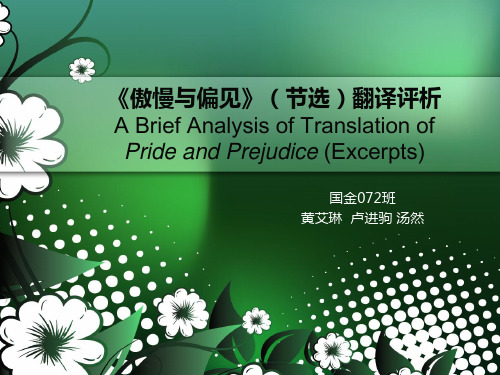
Opening
改译:将“总想” 改为“总要”,因 为是客观真理
It is a truth universally acknowledged that a single man in possession of a good fortune must be in want of a wife. However little known the feeling or views of such a man may be on his first entering a neighborhood, this truth is so well fixed in the minds of the surrounding families that he is considered as the rightful property of some one or other of their daughters. 改译:有钱的单身汉总要娶位太太,这是一条举世公认的真 凡是有钱的单身汉,总想娶位太太,这已经成了一条举世公 理。每逢这样的单身汉新搬到一个地方,四邻八舍的人家尽 认的真理。这样的单身汉,每逢新搬到一个地方,四邻八舍虽然 管对他的心思想法一无所知,可是,既然这样的一条真理早 完全不了解他的性情如何,见解如何,可是,既然这样的一条 已在人们心目中根深蒂固,因此人们总是把他看作自己某一 真理早已在人们心目中根深蒂固,因此人们总是把他看作自己 个女儿理所应得的一笔财产。 某一个女儿理所应得的一笔财产。 ——王科一译
blind to the impropriety of
her father's behavior as a husband. She had always seen it with pain…
Pride and Prejudice

名著选读AS soon as they were gone,Elizabeth walked out to re-cover her spirits;or in other words,to dwell without inter-ruption on those subjects that must deaden them more.Mr.Darcy ’s behaviour astonished and vexed her.“Why,if he came only to be silent,grave,and indiffer-ent,”said she,“did he come at all?”“He could be still amiable,still pleasing,to my uncle and aunt,when he was in town;and why not to me?If he fears me,why come hither?If he no longer cares for me,why silent?Teazing,teazing,man!I will think no more about him.”Her resolution was for a short time involuntarily kept by the approach of her sister,who joined her with a cheerful look,which shewed her better satisfied with their visitors,than Elizabeth.“Now,”said she,“that this first meeting is over,I feel perfectly easy.I know my own strength,and I shall never be embarrassed again by his coming.I am glad he dines here on Tuesday.It will then be publicly seen that,on both sides,we meet only as common and indifferent acquain-tance.”“Yes,very indifferent indeed,”said Elizabeth,laugh-ingly.“Oh,Jane,take care.”“My dear Lizzy,you cannot think me so weak,as to be in danger now?”“I think you are in very great danger of making him as much in love with you as ever.”They did not see the gentlemen again till Tuesday;and Mrs.Bennet,in the meanwhile,was giving way to all the《傲慢与偏见》(Pride and Prejudice )是英国女小说家简·奥斯汀的长篇小说。
Pride_and_Prejudice傲慢与偏见简介英国文学

Walter Scott praised her: “That young lady has a talent for describing the involvements and feelings and characters of ordinary life which is to me the most wonderful I ever met with. The big-wow strain I can do myself, like any now going; but the exquisite touch which renders ordinary commonplace things and characters interesting from the truth of the description and the sentiment, is denied to me. What a pity such a gifted creature died so early!”
Austen’s literary concern
As a novelist Jane Austen writes within a very narrow sphere.
Pride and Prejudice
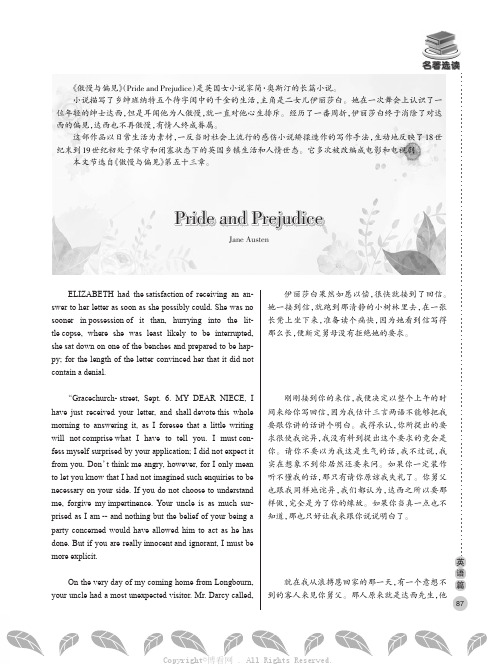
ELIZABETH had the satisfaction of receiving an an-swer to her letter as soon as she possibly could.She was nosooner in possession of it than,hurrying into the lit-tle copse,where she was least likely to be interrupted,she sat down on one of the benches and prepared to be hap-py;for the length of the letter convinced her that it did notcontain a denial.“Gracechurch-street,Sept.6.MY DEAR NIECE,Ihave just received your letter,and shall devote this wholemorning to answering it,as I foresee that a little writingwill not comprise what I have to tell you.I must con-fess myself surprised by your application;I did not expect itfrom you.Don’t think me angry,however,for I only meanto let you know that I had not imagined such enquiries to benecessary on your side.If you do not choose to understandme,forgive my impertinence.Your uncle is as much sur-prised as I am--and nothing but the belief of your being aparty concerned would have allowed him to act as he hasdone.But if you are really innocent and ignorant,I must bemore explicit.On the very day of my coming home from Longbourn,your uncle had a most unexpected visitor.Mr.Darcy called,《傲慢与偏见》(Pride and Prejudice)是英国女小说家简·奥斯汀的长篇小说。
傲慢与偏见英文简介
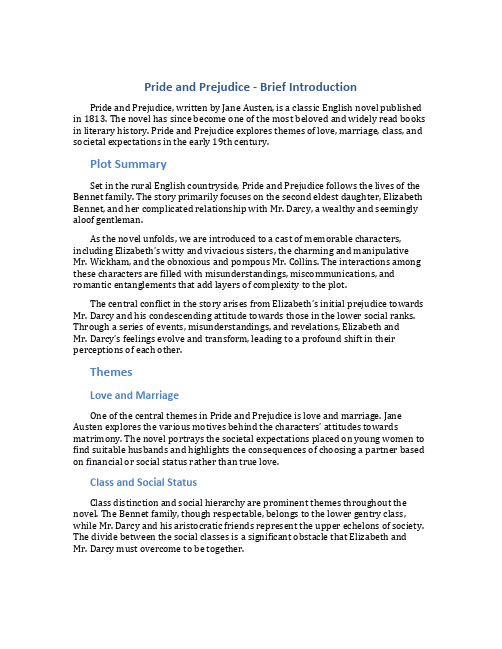
Pride and Prejudice - Brief Introduction Pride and Prejudice, written by Jane Austen, is a classic English novel published in 1813. The novel has since become one of the most beloved and widely read books in literary history. Pride and Prejudice explores themes of love, marriage, class, and societal expectations in the early 19th century.Plot SummarySet in the rural English countryside, Pride and Prejudice follows the lives of the Bennet family. The story primarily focuses on the second eldest daughter, Elizabeth Bennet, and her complicated relationship with Mr. Darcy, a wealthy and seemingly aloof gentleman.As the novel unfolds, we are introduced to a cast of memorable characters, including Elizabeth’s witty and vivacious sisters, the charming and manipulative Mr. Wickham, and the obnoxious and pompous Mr. Collins. The interactions among these characters are filled with misunderstandings, miscommunications, and romantic entanglements that add layers of complexity to the plot.The central conflict in the story arises from Elizabeth’s initial prej udice towards Mr. Darcy and his condescending attitude towards those in the lower social ranks. Through a series of events, misunderstandings, and revelations, Elizabeth and Mr. Darcy’s feelings evolve and transform, leading to a profound shift in their perceptions of each other.ThemesLove and MarriageOne of the central themes in Pride and Prejudice is love and marriage. Jane Austen explores the various motives behind the characters’ attitudes towards matrimony. The novel portrays the societal expectations placed on young women to find suitable husbands and highlights the consequences of choosing a partner based on financial or social status rather than true love.Class and Social StatusClass distinction and social hierarchy are prominent themes throughout the novel. The Bennet family, though respectable, belongs to the lower gentry class, while Mr. Darcy and his aristocratic friends represent the upper echelons of society. The divide between the social classes is a significant obstacle that Elizabeth and Mr. Darcy must overcome to be together.Prejudice and MisunderstandingThe title of the novel encapsulates one of its major themes - prejudice. Both Elizabeth and Mr. Darcy hold initial biases and make quick judgments about each other based on their first impressions. The story subtly critiques the dangers of preconceived notions and highlights the importance of open-mindedness and self-reflection.Significance and LegacyPride and Prejudice has had a lasting impact on literature and popular culture. The n ovel’s enduring popularity can be attributed to Austen’s masterful storytelling, memorable characters, and timeless themes. It has been adapted into numerous film and television adaptations, further cementing its status as a beloved classic.The novel also continues to resonate with readers today due to its exploration of love, marriage, and societal expectations. Austen’s nuanced portrayal of female characters navigating a patriarchal society has made Pride and Prejudice a seminal work of feminist literature.In conclusion, Pride and Prejudice is a landmark novel that explores the complexities of love, societal expectations, and the consequences of prejudice. Jane Austen’s wit, insight, and compelling storytelling continue to captivate readers, making this timeless classic a must-read for anyone seeking a rich and rewarding literary experience.Note: This brief introduction provides only a glimpse into the intricate plot and themes of Pride and Prejudice. Reading the full novel is highly recommended for a co mprehensive understanding of Austen’s work.。
Pride and Prejudice

名著选读《傲慢与偏见》(Pride and Prejudice)是英国女小说家简·奥斯汀的长篇小说。
小说描写了乡绅班纳特五个待字闺中的千金的生活,主角是二女儿伊丽莎白。
她在一次舞会上认识了一位年轻的绅士达西,但是耳闻他为人傲慢,就一直对他心生排斥。
经历了一番周折,伊丽莎白终于消除了对达西的偏见,达西也不再傲慢,有情人终成眷属。
这部作品以日常生活为素材,一反当时社会上流行的感伤小说矫揉造作的写作手法,生动地反映了18世纪末到19世纪初处于保守和闭塞状态下的英国乡镇生活和人情世态。
它多次被改编成电影和电视剧。
本文节选自《傲慢与偏见》第五十四章。
Pride and PrejudiceJane Austen名著选读maining partiality for her might assist his endeavours in awhere her peace of mind must be materially concerned.painful,exceedingly painful,to know that they were undergations to a person who could never receive a return.Theythe restoration of Lydia,her character,every thing,toOh!how heartily did she grieve over every ungracioustion she had ever encouraged,every saucy speech she hadrected towards him.For herself she was humbled;butproud of him.Proud that in a cause of compassion andhe had been able to get the better of himself.She readaunt’s commendation of him again and again.It wasenough;but it pleased her.She was even sensible of somesure,though mixed with regret,on finding howly both she and her uncle had been persuaded thatconfidence subsisted between Mr.Darcy and herself.She was roused from her seat,and her reflectionssome one’s approach;and before she could strike intopath,she was overtaken by Wickham.“I am afraid I interrupt your solitary ramble,myter?”said he,as he joined her.“You certainly do,”she replied with a smile;“but itnot follow that the interruption must be unwelcome.”“I should be sorry indeed,if it were.We were alwaysfriends;and now we are better.”“True.Are the others coming out?”“I do not know.Mrs.Bennet and Lydia are going inriage to Meryton.And so,my dear sister,I find,fromcle and aunt,that you have actually seen Pemberley.”She replied in the affirmative.“I almost envy you the pleasure,and yet I believe itbe too much for me,or else I could take it in my way tocastle.And you saw the old housekeeper,I suppose?Reynolds,she was always very fond of me.But ofdid not mention my name to you.”“Yes,she did.”“And what did she say?”可是她也他对她依旧未能忘情,因此遇到他还是愿意尽这真是痛苦,说不尽的能够保全了人格,这竟会对他那样出言唐突,真是万同时又为他感到骄傲。
prideandprejudice赏析

目录
• 作品背景 • 故事梗概 • 人物分析 • 语言艺术 • 思想意义 • 比较研究
01
作品背景
作者简述
简·奥斯汀(Jane Austen):英国女小说家,出生于1775年,是19世纪最著名的女性作家之一。她的小 说主要描写了当时英国乡村中产阶级的日常生活和婚恋观念,以其独特的幽默和敏锐的观察力而著称。
自我价值的实现
小说中的女性角色通过自我提升和自我实现,证明了女性同样可以在 社会和家庭中发挥重要作用。
社会批判
批判虚伪社交圈子
小说揭示了当时社会上流行的虚伪社交圈子 的丑陋面目,批判了人们为了追求地位和财 富而忽视真正的人性和道德。
批判婚姻观念
小说对社会上流行的功利主义婚姻观念进行了批判 ,强调了真爱和感情在婚姻中的重要性。
Mr. Bingley
Jane的爱人,善良、友好,但稍显轻 浮。
故事情节概述
故事发生在19世纪英国的乡间,主要 讲述了伊丽莎白和达西先生之间的爱 情故事。
伊丽莎白因为对达西先生的傲慢和偏 见产生反感,但随着两人交往的深入, 她逐渐发现他内心的善良和真诚,两 人最终克服障碍,走到一起。
主题思想
01
人性的成长与变化
03
小说中的角色们在经历各种挫折和困难后,逐渐认识到自己的
错误并成长和改变,展现了人性的成长与变化过程。
06
比较研究
与其他文学作品比较
简·奥斯汀的其他作品
通过比较《傲慢与偏见》与简·奥斯汀的其 他作品,如《理智与情感》和《曼斯菲尔德 庄园》,可以发现她在不同作品中探讨的道 德、社会和情感主题的共性和差异。
自然流畅
作者运用自然流畅的语言,使得故事情节发展自然,人物对话生动,让读者感受到真实 的人物情感。
傲慢与偏见(生词)全解

Pride and PrejudiceChapter 1 (72 单词)abuse n.滥用;恶习;侮辱;恶言vt.滥用;虐待;辱骂account n.账,账目;存款;记述,报告;理由vi.解释;导致;报账vt.认为;把…视作acknowledge vt. 承认,公认,告知收到,表示感谢,注意到affect vt. 影响, 作用, 感动assure vt. 保险,保证,确信,担保caprice n. 反复无常, 任性, 异想天开chaise n. 一种轻马车(通常有车蓬,尤指单马双轮者)chapter n. 章,回,篇,牧师的例行会议,地方分会character n. 个性, 品质; 字符; 人物; 名誉; 地位comer n. 有(成功)希望的人compassion n. 同情,怜悯consent n. 同意, 许可v. 同意, 承诺consider vt. 考虑, 思考, 认为consideration n. 考虑, 体贴, 考虑因素, 敬重, 意见daren. 敢, 挑战aux. 敢vi. 敢vt. 敢于, 勇于面对delight n. 快乐,高兴vi. 给与乐趣,使高兴vt. 使高兴desire n. 愿望, 欲望, 情欲v. 向往, 要求, 请求vt. 渴望determine vt.& vi.(使)下决心,(使)做出决定vt.决定,确定;判定,判决;使决定;限定vi.[主用于法律]了结,终止,结束discontent n. 不满adj.不满的v.令(人)不满engage v. 答应, 预定, 使忙碌, 雇佣, 订婚establishment n. 确立,制定,设施,机构,权威extraordinary adj. 非凡的,特别的,特派的fancied adj. 空想的,虚构的fix vt. &vi. 使...固定,修理,准备n. 困境, (船只、飞机等的)定方位,贿赂flatter vt.& vi. 阿谀奉承, 取悦, 炫耀n. 平整工具fortune n. 财产,命运,运气general n. 一般,将军,大体adj. 一般的,普遍的v. 指挥,作...将军handsome adj. 英俊的,慷慨大方的,可观的,灵巧的hearty adj. 诚恳的, 热烈的, 丰盛的,好胃口的n. 水手humour n. 幽默,诙谐,幽默感n. 体液vi. 纵容, 迁就=humor(美) ignorant adj. 不知道的, 无知的, 愚昧的immediately adv. 立即,直接地conj. 一...(就)indeed adv. 的确, 真正地, 事实上insufficient adj. 不足的invitation n. 邀请Jane n. 简(女子名)Lucas n. 卢卡斯(姓氏,Luke的异体)Lydia n. 莉迪亚(女子名) n. 小亚细亚西部的富裕古国mention vt.提到,说起;提名表扬n.提及merely adv. 仅仅,只不过mixture n. 混合, 混合物nerve n. 神经(生物),精神,勇气,叶脉vt. 鼓起勇气nervous adj. 紧张的,焦虑的,神经质的nonsense n. 无意义的事,荒谬的言行,荒唐objection n. 反对,异议occasionn. 场合,机会,理由vt. 致使,惹起,引起odd adj. 奇数的,古怪的,剩余的. 奇数scrupulous adj. 小心谨慎的, 细心的,严谨的possession n. 财产, 所有, 拥有preference n. 偏爱,优先,喜爱物prejudice n. 偏见,成见,伤害v. 使...存偏见,使...有成见,伤害pretend vt. &vi. 假装,伪称adj. 假装的,赝品的,模拟的pride n. 高傲,自豪,自尊,一群狮子vt. 以...自豪property n. 财产; 性质; 道具recommend vt. 建议, 推荐, 劝告vt. 使成为可取, 使受欢迎reply vt. &vi. &n. 回答,答复reserve n. 预备品, 贮存, 候补n. 克制, 含蓄vt. 保留, 预订, 延期respect n. 尊敬, 敬重; 关系, 方面vt. 尊敬, 尊重; 关于, 涉及rightful adj. 合法的, 正确的, 依法享有权利的sarcastic a dj. 讽刺的servant n. 仆人settle n. 有背的长凳vt. 安放,安顿,解决,决定,付清(欠款) vi. 定居,降落sillyadj. 愚蠢的,淳朴的,晕的solace n. 安慰v. 使快乐vt. 安慰(物), 缓和suffer vt. 遭受,忍受,允许vi. 忍受,经历surely adv. 的确地, 安全地surround n. 环绕物vt. 包围,环绕temper n. 脾气;(钢等)回火;性情;倾向vt. 使回火;锻炼;调和;使缓和vi. 回火;调和tiresome a dj. 令人厌倦的,讨厌的uncertain adj. 不确定的universally adv. 普遍地vex vt. 恼怒,使恼火Chapter 2 (56 单词)acquaint vt. 使...熟知acquaintancen. 熟人,相识,了解actually adv. 实际上,事实上adv. 居然,竟然(表示惊讶)adjust vt. 调整, 使...适于vi. 适应advantage n. 优势,有利条件vt. 有利于amend vt. 修正,改善,改良vi. 自我修正among prep. 在...之中amusement n. 娱乐, 消遣assembly n. 集合, 集会, 装配astonishment n. 惊讶,令人惊讶的事aye n. 赞成者,赞成票adv. 是,赞成adv. 常常,永远=aycircumspection n. 细心, 慎重cough n. 咳嗽vt. &vi. 咳嗽declare vt. &vi. 宣布,声明,申报decline n. 衰微, 跌落; 晚年v. 降低, 婉谢deign v. 屈尊,惠允(做某事) vi. 屈尊vt. 赐于disclose vt. 揭露discretion n. 谨慎,判断力,个人选择,选择的自由[计算机] 判定Elizabeth n. 伊莉莎白(女子名)emphatic adj. 语调强的, 用力的, 强调了的excellent adj. 极好的,优秀的exclamation n. 惊呼, 惊叹词expect vt.期望;预料;要求;认为(某事)会发生vi.预期;期待;怀胎;怀孕extract n. 榨出物,精华,摘录vt. 拔出,榨出,摘录,提取,选取[计算机] 提取fatigue n. 疲乏,疲劳,累活adj. 疲劳的vt. 使...疲劳,使...心智衰弱vi. 疲劳fortnightn. 两星期,十四天heaven n. 天堂;天空honour n. 荣誉,荣幸,头衔vt. 尊敬,信守承诺,方形舞中鞠躬致敬hypocritical adj. 伪善的,伪善者的intend v. 打算vt. 想要,打算,计划introduction n. 介绍, 引进, 导论, 序言kindness n. 仁慈, 好意knowledge n. 知识,了解manner n. 样子,礼貌,风格,方式matter n. 事件, 物质, 原因vi. 有关系neglect n. 疏忽,忽略,怠慢vt. 疏忽,忽视,不顾observe v. 观察, 遵守, 注意到paidadj.已付钱的,有薪俸的动词pay的过去式和过去分词persuade v. 说服vt. 劝说,说服pleasant adj. 令人愉快的,舒适的promise n. 诺言, 约定, (有)希望,预示v. 允诺, 约定, 预示, 有可能rapture n. 狂喜vt. 使狂喜reflection n. 反映,映像,折射,沉思,影响sake n. 缘故, 利益, 好处scold n. 老爱责骂的人v. 责骂,训斥vi. 责骂,申斥vt. 责骂selfish adj. 自私的, 利己的sensible adj. 可察觉的,意识到的,实用的n. 可感知物sick adj. 恶心的, 有病的, 腻烦的, 晕的n. 病人, 呕吐物vt.追逐, 攻击; 唆使stare vt. 凝视,显眼,变硬vi. 凝视n. 凝视stress n. 紧张, 压力v. 强调, 着重vt. 强调n.负载surpass vt. 超越,凌驾,胜过tear n. 眼泪,撕破的(洞或裂缝),撕扯vt. 撕掉,扯下,扰乱vi. 流泪,撕破tease vt.取笑,戏弄;挑逗;强要vi.梳理(羊毛等);起绒n.爱嘲弄他人的人;取笑卖弄风骚的人trim n. 整齐,装饰,修剪下来的部分adj. 整洁的,匀称的adv. 整齐地vt. 修除,削剪,装备,痛打,击败, 使整洁vi. 保持平衡, 见风使舵tumult n. 骚动, 吵闹,喧哗venture n. 冒险,风险,投机vt. 敢尝试,谨慎地做,冒险一试vi. 冒险做Chapter 3 (145 单词)accomplish vt. 完成admiration n. 钦佩, 赞赏admire vt. 钦佩, 羡慕, 赞美admit vt.& vi.许可进入;承认,供认vt.允许;确认vi.承认;允许afterwards adv. 以后, 后来against prep. 反对,倚靠,违背,防御,相比,相对amiable adj. 和蔼的, 亲切的ankle n. 踝, 踝关节ascertain vt. 确定,探知,查明assistance n. 帮助, 援助attack vt.& vi.攻击,进攻,抨击n.攻击;抨击;(队员等的)进攻;(疾病)侵袭vt.抨击;非难;侵袭;损害attentionn. 注意(力),关心,立正barefaced adj. 公然的, 无耻的, 无面具的, 无胡须的behaviorn. 行为,举止behold vt. 看到, 领悟, 注视vi. 看, 看啊(多用于祈使句, 引起人的注意) branch n. 分支,树枝vt &vi. 分支, 分岔brother-in-law n. 内兄, 内弟, 大伯子, 小叔子, 姐夫, 妹夫Catherine n. 凯萨琳(女子名)charm n. 魔力, 魅力, 护身符, 小饰物vt. 吸引, 使...迷醉, 对...施以魔法circulation n. 流通,循环,发行量,消息传播coat n. 外套,一层,动物皮毛vt. 外面覆盖,盖上毛衣coldly adv. 冷淡地comfort n. 舒适,安慰,安慰者vt. 安慰compare v t.&vi. 比较,比喻,对照n. 比较,对照conceited adj. 自负的, 幻想的consequence n. 结果,后果consequently adv. 所以, 因此consist n. 组成vi. 组成,存在,一致contrast n.对比,对照;差异;对照物,对立面;[摄]反差conversation n. 会话,谈话cordial n. 兴奋剂, 补品adj. 热忱的, 诚恳的, 兴奋的countenance n. 面容,面部表情,支持v.支持, 赞成, 同意course n. 课程, 讲座, 过程, 路线, 一道(菜)cousin n. 堂(或表)兄弟(姐妹)creature n. 生物, 动物, 人credit n. 信用, 荣誉, 贷款, 学分v. 归功于, 赞颂, 信任crown n. 王冠,王权,顶点,花冠vt. 使...成王,加冕,居...之顶,为牙齿镶上假齿冠vi. 火迅速烧到树的顶端curiosityn. 好奇, 好奇心defer vt. 延期, 缓召, 把...委托给他人vi. 耽搁, 延误, 遵从delightful adj. 令人愉快的, 可喜的description n. 描写, 描述, 说明书, 作图n. 类型detest v. 厌恶disagreeable adj. 不愉快的, 厌恶的, 不为人喜的disgust n. 厌恶,嫌恶vt. &vi. 令人厌恶dispatch n. 派遣;急件vt. 派遣;分派disconcert vt. 使困惑, 使仓皇失措, 破坏disposition n. 性情,倾向,安排, 处置, 控制[计算机] 配置情况distant adj. 遥远的,疏远的,远房的,陌生的,远行的distinguish vt. 区别,辨认,特别关注vi. 区别elegant adj. 优雅的, 精美的, 俊美的elude v. 逃避, 躲避endure vt. 忍耐,容忍vi. 持久,持续enquire =inquire v. 询问, 调查entertainvt. &vi. 娱乐,招待,怀抱entrance n. 入口v. 使出神,使入迷vt. 使出神equally adv. 相等地, 同样地, 平等地estate n. 财产,房地产,状态,遗产event n. 大事, 事件, 项目, 活动exaggeration n. 夸张,夸大excess adj. 过量的,附加的n. 超过,超越,过度,过量expectation n. 期待,期望v. 期待,前程extremely adv. 极其, 非常fancy n. 想像力, 幻想, 喜好, 爱adj. 想像的, 时髦的, 华丽装饰的, 奢侈的, 技巧的vt. 想象, 自认为, 喜好fastidious adj. 难取悦的, 挑剔的, 苛求的=particularfavorable adj. 有利的,赞许的,良好的,顺利的,偏袒的fear n. 敬畏,害怕,担心,不安的原因vt. 害怕,敬畏feature n. 特征, 容貌vt. 以...为特色vi. 起重要作用figure n. 图形, 数字, 形状; 人物, 外形, 体型v. 演算, 认为, 领会到finery n. 装饰,服饰,鲜艳服装fond adj. 喜欢的;温柔的;宠爱的forbid vt. 禁止,妨碍, 阻止fortunate adj. 幸运的,侥幸的gentleman n. 绅士, 先生,有教养的人gown n.长袍,长外衣;女长服;罩袍;大学的学生和教师gratify v. 使满足,使高兴v. 酬劳,回报grieve v. 使...悲伤handsome adj. 英俊的,慷慨大方的,可观的,灵巧的horrid adj. 可怕的, 极可厌的, 毛骨悚然的housekeep vi. 自立门户,主持家务ingenious adj. 机灵的,精制的,有独创性的inhabitant n. 居民instead adv. 代替, 反而insupportable adj. 忍耐不住的, 不能容忍的, 不合理的intelligence n. 理解力, 智力, 情报, 情报工作, 情报机关interrupt n. 中断vt. 打断,妨碍vi. 插嘴[计算机] 中断kingdom n. 王国,领域,界Kingdom:天国lace n. 饰带, 花边, 缎带v. 结带子, 饰以花边library n. 图书馆, 藏书lively 活泼的, 活跃的, 栩栩如生的, 真实的maria 名词mare的复数形式Maria: 玛丽亚(女子名)mien n. 风采, 态度,外表moment n. 片刻,瞬间,准确时刻,非常重要的时机,力矩neighbor n. 邻居v. 邻接, 毗邻而居, 友好noble adj. 高尚的, 宏伟的, 贵族的, 高贵的n. 贵族oblige vt. 强制, 施恩惠vi. 帮忙occasional adj. 偶然的, 不时的overhearv. 无意中听到, 偷听particular n. 个别项目, 详细说明adj. 特别的, 独有的; 挑剔的; 详细的particularly adv. 特别, 尤其partner n. 合作者,搭档,配偶vt. &vi. 同...合作,做...的搭档, 合作playful adj. 爱玩耍的,幽默的popularity n. 普及,流行principal adj. 主要的n. 负责人, 校长, 资本pronounce vt.& vi. 发音,宣告,断言,发表意见protest n. 抗议, 反对, 抗议书vi. 反对,抗议,断言vt. 坚持地表示, 对...提出异议punishment n. 惩罚quality n. 品质, 特质, 才能adj. 高品质的raise n. 上升, 增高; 高地vt. 升起, 举起, 饲养; 提出, 引起rather adv. 宁可,宁愿,有些,相当,反而regardless adj. 不注意的, 粗心的adv. 不顾reimbursement n. 偿还, 偿付, 赔偿remain v. 保持, 依然, 剩余, 留下, 逗留n. 遗迹, 剩余物, 残骸resentment n. 怨恨, 愤恨ridiculous adj. 可笑的;荒谬的rudenessn. 粗鲁, 无礼satisfactory adj. 令人满意的scarcity n. 缺乏,不足,缺少second-hand adj. 旧的,用过的seek n. 找寻v. 寻求,寻找,搜索several adj. 几个,各自的pron. 若干shock n. 震动,冲突,震惊,休克vt. &vi.震动,冲突,使...受电击sight n. 景观, 视力, 眼界vt. 看见, 观看vi. 瞄准slight n. 轻蔑adj. 轻微的,纤细的,脆弱的vt. 轻视,忽略somewhat adv.稍微;有点;达到某种程度n.少量;某些数量;某种程度spirit n. 精神splendid adj. 辉煌的;灿烂的;极好的;杰出的sprain v.&n. 扭伤strike n. 罢工, 打击, 殴打v. 打, 撞, 罢工, 划燃stupid adj. 愚蠢的,笨拙的,麻木的,无趣味的n. 傻瓜sufficient adj. 足够的, 充分的suit n. 套装, 诉讼, 请求v. 适合, 取悦, 满足supposition n. 想像, 推测, 推想surmise n. 推测vt. 推测, 臆测tempt vt. 诱惑;引起;冒…的风险;使感兴趣tide n. 潮,趋势,潮流vt. 使...随潮漂流vi. 涌动tolerableadj. 可容忍的, adj. 还不错的towards prep. 朝, 向unaffected adj. 不受影响的,不矫揉造作的, 自然的uncommonly adv. 稀罕(极,非常)unreserved adj. 没有被预订的unworthy adj. 无价值的, 没有优点的adj. 不值得的;不应得的upper adj. 上部的,地位较高的,上面的,北方的n. 鞋帮,上牙,兴奋剂,令人愉快的经历various adj. 各种各样的violent adj. 暴力的,猛烈的,极端的,曲解的withdraw vt. 撤回,取回,撤退vi. 退回,撤退Chapter 4 (89 单词)accidental adj. 意外的,偶然的,附属的n. 偶然,不重要的东西,变调的临时符号acquire vt. 占有,获得,取得,学到affectation n. 假装, 虚饰, 做作amount n. 数量, 总额vi. 总计, 等于anxious adj. 焦急的, 忧虑的approve vt. 批准,核准,证实vi. 赞同apt adj. 恰当的;有…倾向的;灵敏的associate vt.(使)发生联系;(使)联合;结交;联想vi.联盟;陪伴同事n.合伙人;伴侣,同志;非正式会员adj.联合的;合伙的;非正式的;(性质上)有密切联系的attentive a dj. 注意的, 留意的breed n. 品种,族类vt. 养育,繁殖,引起vi. 繁殖calculate vt. 计算,估计,考虑,推测vi. 计算,预测,依赖candid adj. 忠实的, 率直的, 坦诚的candour n. 坦率, 正直=candorcautious adj. 十分小心的, 谨慎的censure n. 责难, 非难v. 非难, 责备,公开谴责characteristic adj. 特有的, 典型的n. 特性, 特征, 特色circumstance n. 环境,(复数)境况,事件,详情collection n. 收藏品,收集物,小组,集合commendation n. 赞赏, 嘉奖,推荐,奖状,奖赏commonadj. 共同的, 平常的, 普通的n. 平民, 普通, 公地, 公园compliment n. 称赞,恭维,(复数)致意vt. 称赞,恭维conceive vt. &vi. 构思,以为,怀孕contrary adj. 相反的,截然不同的adv. 相反(地) n. 反面,相反converse n. 相反的事物,倒,逆向adj. 相反的,逆向的,倒的v. 交谈,谈话[计算机] 转换convince vt. 说服, 使...相信county n. 郡, 县dispose vt. 倾向于,处置vi. 销毁dissatisfied adj. 不满意的, 不高兴的动词dissatisfy的过去式和过去分词doubtful adj. 可疑的, 疑心的, 不确定的easen. 安乐,安逸,悠闲vt. 使...安乐,使...安心v. 减轻,放松easiness n. 容易,轻松,安适endear v. 使受喜爱entitle v. 取名为,给与名称,叫做,使有权利establishv. 建立, 确立, 创办express n. 快车, 快递, 专使adj. 急速的, 明确的, 直接的adv. 用快递; 特意地vt. 表达, 表示; 挤压出; 快递fashion n. 流行,风尚,时样,时装v. 形成,造,作firmn. 商行,公司vt. (使)变得坚实,定案vi. 变硬,恢复adj. 坚定的,坚固的,结实的adv. 稳固地,坚定地folly n. 愚蠢, 荒唐事(复)follies: 轻松歌舞剧formality n. 礼节,程序,拘谨former adj. 以前的,在前的pron.&n. 前者gallantry n. 勇气,豪勇,勇敢的行为generation n. 代, 一代greatly adv. 很, 非常habit n. 习惯,习性;嗜好vt. 使穿衣hasty adj. 匆匆的, 轻率的, 急忙的hat trick n. 〈板球〉连中三柱,使对方三击球手退场(帽子戏法)honestly adv. 诚实地,真诚地, 公正地,的确,实在impress n. 印象,特徵,印记vt. 使...有印象,影响,印刻,传送vi. 给人印象inherit vi. 继承vt. 继承,遗传invite vt. 邀请,要求n. 邀请judgement n. 判断liberty n. 自由;许可;冒失likewise adv. 同样地,此外,(表示感觉相同)我也是manor n. (封建领主的)领地, 庄园meanly adv.谦卑地,卑劣地,吝啬地memory n. 记忆,内存,回忆natural adj.自然的;物质的;天生的;不做作的n.自然的事情;(生来的)白痴;[乐](风琴等的)白键object n. 物, 物体, 目标, 宾语v. 反对,提出...作为反对的理由observation n. 观察,观察力,评论adj. 被设计用来观察的offence n. 犯罪,过错,攻击,令人讨厌的事物offer n. 出价, 提议vt. 提供, 出价; 贡献, 奉献vi. 提议; 出现; 求婚openness n. 开放,空旷,公开,直率,松脆opposition n. 反对,敌对,在野党ostentation n. 卖弄,夸耀,摆阔,讲排场pleasant adj. 令人愉快的,舒适的pliancy n. 柔软, 柔顺praise n. 赞美,称赞,崇拜vt. 称赞,归荣誉于,赞美vi. 赞美preside v. 任主席, 统辖, 当主人private adj. 私人的,隐蔽的n. 士兵,列兵provide vi. 供给, 提供vt. 提供; 规定; 准备purchase n. 购买, 购买的物品n. 支点; 紧握, 抓紧vt. 购买, 赢得; (用设备)举起, 移动rank n. 队列,排名,等级,军衔,阶级adj. 繁茂的,恶臭的,讨厌的vt. 排列,归类于recommendation n. 推荐, 介绍regard vt.认为;注视;涉及;尊敬vi.凝视;留意n.凝视;留意;尊敬;问候reliance n. 信赖,所信赖的人或物remainder n. 剩余物, 其他的人, 残余vt. 廉价出售adj. 剩余的respectable n. 品格高尚的人adj. 值得尊重的, 人格高尚的, 不少的seminary n. 神学院, 学院,发源地sense n. 侦测, 感官, 感觉; 理智; 意义vt. 感觉, 了解; 检测situation n. 位置, 形势, 局面, 处境, 状况, 职位spite n. 恶意, 怨恨vt. 刁难, 伤害steady adj. 稳定的,稳固的,沉稳的adv. 平稳地,稳固地n. 固定的事物vi. &vt. (使)稳固,(使)稳定strength n. 力量,力气,长处,强度superior n. 上级,高手,上标adj. 上层的,上好的,出众的,高傲的tenant n. 房客,佃户vt. 居住thereby adv. 因此,从而trade n. 贸易,商业,交易,行业,同行,手工艺,主顾,(复数)信风vi. 做生意,购物,交换vt. 用某物交换,做买卖adj. 商业的,专业性的,同行的unwilling adj. 不愿意的wonder n. 惊奇;奇迹;惊愕vi. 怀疑;想知道;惊讶vt. 怀疑;惊奇;对…感到惊讶adj. 奇妙的;非凡的Chapter 5 (59 单词)absolutely adv. 绝对地,完全地;独立地;确实地argument n. 辩论,争论,论点(据),理由beg vt. 乞讨,恳求,合理需要vi. 行乞,乞求abbr. (begin)的缩写,开始beyond adv. 在更远处,另外n. 远处, 来世prep. 超出, 越过,另外carriage n. 四轮马车,车厢Charlotte n. [法]水果奶油布丁Charlotte: 夏洛特(女子名)cherish vt. 珍爱,抚育,珍藏civil adj. 国内的,公民的,文明的, 有礼貌的, 民用的communicate vt. 传达, 传播vi. 交流, 沟通, 联通courteous adj. 有礼貌的,殷勤的denominate v. 命名,称…为directly adv. 直接地(立即,完全)distinction n. 区别; 卓越; 殊荣fail vi. 衰退,失败,不及格vt. 辜负,缺少,未能做n. 不及格elate vt. 使欢欣adj. 兴高采烈的favour [英]n. 偏爱;赞同;善行vt. 赞成;喜爱;有助于forgive vt. &vi. 原谅,饶恕,宽恕formerlyadv. 以前, 从前foxhound n. 猎狐用猎狗hack n. 劈, 砍, 出租马车v. 劈, 砍, 干咳treatment n. 治疗,疗法,处理imaginary adj. 想象的, 虚构的inoffensive adj. 无害的, 没恶意的, 不讨厌的intelligent adj. 聪明的, 智能的intimate adj. 亲密的,私人的,秘密的n. 密友vt. 透露,暗示James n. 詹姆斯(姓氏, 男子名)knighthood n. 骑士身份, 骑士气质, 骑士lip n. 嘴唇lodge n. 旅馆;门房;集会处;山林小屋vt. 提出;寄存;借住;嵌入vi. 寄宿;临时住宿Lucas n. 卢卡斯(姓氏,Luke的异体)madam n. 夫人,女士,老鸨mayoralty n. 市长职位misfortune n. 不幸, 灾祸mortify v. 抑制,苦修,使...悔恨occupy vt. 占领,占,住进offend vt. 犯罪,冒犯vi. 令人不适,违反pique n. 生气, 愤怒v. 伤害...自尊心, 激怒,刺激presentation n. 陈述, 介绍, 赠与n. [美]讲课, 报告prone adj. 俯卧的, 易于...的, 有...倾向的purpose n. 目的, 意图; 意志, 决心; 议题vt. 打算, 决意relate vt.& vi.(把…)联系起来;讲,叙述(故事等)vt.讲述,叙述;使…有联系;建立或展示联系vi.有联系;涉及;符合;发生共鸣remarkably adv. 显著地, 引人注目地, 非常地render vt. 使成为, 提供, 报答, 着色; 执行, 实施vi. 给予补偿n. 交纳, 粉刷, 打底residence n. 住处, 住宅, 居住rise n. 上升,增加,小山v. 升起,起身,上升,(日、月、星)升起Robinson n. 罗宾逊(姓氏, 男子名)score n.得分;分数;总谱;20个v.得分;记分;评分;获得胜利self-command n. 自制,克己self-complacency adj. 自我满足的solely adv. 独自地,单独地solidity n. 坚固,稳健,固态somehow adv. 不知怎么地,以某种方式supercilious adj. 目中无人的, 高傲的suppose vt.假定;猜想,推测;认为;让(用于祈祷语气)vi.想象,猜想unshackle vt. 除去... 的枷锁vainadj. 徒然的, 虚荣的, 空虚的valuable adj. 贵重的, 有价值的n. (pl.)贵重物品vanity n. 虚荣心,浮华,无价值的东西adj. 虚荣心的wine n. 酒,葡萄酒,紫红色vt. &vi. 喝酒,请喝酒Chapter 6 (163 单词)accomplishment n. 成就,完成accost v. 招呼, 搭讪adept adj. 熟练的, 老练的n. 名手, 专家adopt v. 采用, 收养, 接受affection n. 慈爱,爱,感情,作用,影响agreeably adv. 欣然, 依照annoy vt. &vi. 使...苦恼,骚扰, 使生气appetite n. 爱好,嗜好,食欲,胃口,欲望application n.适用,应用,运用;申请,请求,申请表格;勤勉,用功;敷用,敷用药approach n. 接近; 途径, 方法v. 靠近, 接近, 动手处理archly adv. 狡猾地,顽皮地arise vi. 上升,引起,出现assemble vt. 聚集,集合,装配vi. 集合, 聚集assert vt. 主张,声明,断言attachment n. 附件, 附著, 附属物, 依恋, 忠诚,依赖[法律]扣押令attempt vt.试图;尝试n.进攻;尝试,冲击attend vt. 参加,注意,照料vi. 专心,留意,待命avoid v. 避免vt. 避免,逃避before hand 预先bestow vt. 授予,适用,利用bown. 弓,船头,鞠躬,蝴蝶结,两手准备vi. 鞠躬, 成弓形,弯腰, 首次上演,屈服,听从,尊重vt. 重压,弯曲,breath n. 呼吸,气息,微风,迹象,精神,一种说话的声音capital n. 首都,资本,大写字母adj. 大写的,资本的,首要的colonel n. 上校command n.命令,指挥;司令部,指挥部;[计算机]指令;控制力vt.指挥,控制,命令;命令;应得,值得vi.给出命令;命令,指令adj.指挥的,根据命令(或要求)而作的commerce n. 商业, 贸易companion n. 同伴, 同事, 成对物品之一, (船的)甲板间扶梯(或扶梯的顶篷) vt. &vi. 陪伴complacency n. 自满,沾沾自喜complaisance n. 彬彬有礼, 殷勤, 奉承composure n. 镇静, 沉著conceal vt. 隐藏, 掩盖concerto n. [音]协奏曲conclude vt. 使结束, 缔结, 断定, 得出结论vi. 结束, 作出决定conjecture v.&n. 推测,臆测consolation n. 安慰,令人安慰的事物contrive vt. 1. (不顾困难地)促成某事2. 巧妙地策划;精巧地制造(如机器)vi. 1. (不顾困难而) 设法做到(正式)critical adj.批评的,爱挑剔的;危险的,危急的;决定性的;[物]临界的criticise v. 批评,评论,吹毛吹疵=criticize(美)cruel adj. 残酷的, 残忍的, 引起痛苦的defect n. 缺点vi. 背叛defy vt. 反抗,藐视,挑衅deny vt. 否认, 拒绝, 反对, 克制desirable adj. 值得有的,令人满意的,有吸引力的n. 有吸引力的人detect vt. 发现,探测信息,侦查vi. 当侦探dinev. 用正餐,进餐disadvantagen. 不利, 不利条件, 损害, 损失discomposure n. 失态, 慌张discovery n. 发现, 发现物display n. 显示,陈列,炫耀vt. 显示,表现,夸示disposition n. 性情,倾向,安排, 处置, 控制[计算机] 配置情况due adj.由于;适当的;预定;到期n.应有的权利;应得到的东西;应缴款adv.正向;正对着enable vt. 使...能够,使可行[计算机] 使能encouragement n. 鼓励endeavor n. 努力, 尽力, 进取心vt. 努力,尽力vi. 企图, 谋求energetic adj. 精力旺盛的,有力的,能量的entirely adv. 完全地entreat vt. 恳求, 乞求engross v. 使全神贯注,独占,大量收购,正式誊写,用大字体书写n. entreaty n. 恳求, 哀求evident adj. 明显的, 明白的exactly adj. 完全的adv. 恰好地,正好地,正确地,精确地,正是excel vt. 超过, 优于vi. 胜出[计算机] 软件名称excellence n. 优秀, 卓越, 优点except vt. 除,除外prep.&conj. 除了...之外,若不是,除非exclusion n. 排除,除外,逐出expression n. 表达,表示,表现,表情,措辞,词句failure n. 失败,失败的人或事familiar adj. 熟悉的,熟知的,不拘礼节的n. 熟人,熟悉某种事物的人fashionable adj. 流行的, 时髦的favorite adj. 流行的,喜爱的n. 最喜爱的人或物, 被认为最有可能胜出的竞争者felicity n. 快乐, 幸福, 幸运flow vi.流;垂;流出;(谈话、文体等)流畅n.流动;滔滔不绝;涨潮;连贯vt.使泛滥;淹没;排出gallant adj. 英勇的, 华丽的,殷勤的n. 时髦男士,对女子殷勤的男士,求爱者,情夫vt. 献殷勤generally adv. 一般地genius n. 天才, 高智力, 天赋glance vi.一瞥;闪微光;掠过,擦过;随便提到,简略地触及n.浏览;闪光;歪斜,一掠gratitude n. 感谢的心情grave adj.重大的,重要的;严重的;[音乐]沉重的;(颜色等)朴素的adv.沉重地,庄重地;极慢地n.坟墓,墓穴;埋葬…的地方;下场;死亡vt.雕刻;铭记guard n. 守卫者,警戒, 护卫队, 保护vt. &vi. 保卫,看守,警惕impatient adj. 不耐烦的, 急躁的impertinent adj. 鲁莽的, 无礼的, 粗鲁的impose vi. 利用;欺骗;施加影响vt. 强加;征税;以…欺骗inconsiderable adj. 不足取的, 琐碎的,不值得考虑的indifference n. 不重视, 无兴趣, 漠不关心indignation n. 愤怒, 愤慨, 义愤inducement n. 诱因,动机,刺激物influence vt. 影响, 感化n. 影响力, 势力; 影响, 权势n. 有影响的人(或事物)inspectorate n. 检查或视察人的职责instant n. 立即, 瞬间adj. 立即的, 即时的instantly a dv. 立即地, 即刻地instrument n. 乐器, 工具, 仪器, 器械intention n. 意图,意向,目的intolerable adj. 无法忍受的, 难耐的invaluable adj. 无价的Irish n. 爱尔兰人, 爱尔兰语adj. 爱尔兰的leisure n. 闲暇;空闲;安逸adj. 空闲的;有闲的;业余的marriage n. 婚姻,结婚matrimony n. 结婚,婚姻生活,婚礼meditate v. 想, 考虑, 计划mix n. 混合(物),融合vt. &vi. 混合,掺入,合成,交往,联系[计算机] 混合mode n. 方式,样式,模式,风格,时兴[音乐] 调式musical adj. 音乐的n. 音乐片nay adv. <古>否, 不n. 拒绝, 反对, 投反对票conj. 不但如此, 而且mortify v. 抑制,苦修,使...悔恨nothingness n. 虚无, 不存在,毫无意义notion n. 观念,想法,主张officer n. 官员,军官vt. 提供官员,指挥opportunity n. 机会, 时机partial adj. 部分的,偏袒的,偏爱的n. 泛音pause n. 暂停,中止,犹豫不决vi. 停顿,中止vt. 使停顿pedantic adj. 卖弄学问的, 假装学者的, 吹毛求疵的, 钻牛角尖的perceive v. 察觉, 感觉, 认知, 理解perfectly adv. 完全地, 无瑕疵地, 完整地,完美地,圆满地performance n.表演;演技;表现;执行performer n. 表演者, 执行者persevere v. 坚持, 孜孜不倦, 不屈不挠persuasion n. 说服,劝说,信念plain n. 平原,草原adj. 简单的,平坦的,平常的,家常的adj.纯的,不掺杂的polish n. 磨光,擦亮;擦亮剂;优雅,精良vi. 擦亮,变光滑vt. 磨光,使发亮;使完美; 改进v. 磨光;修改;润色adj. 波兰的polite adj. 有礼貌的, 客气的, 有教养的porridge n. 粥, 麦片粥pray vt. &vi. 祈祷, 恳求probability n. 可能性, 或然率, 机率proper adj. 适当的,正确的,合适的,正当的,规矩的propriety n. 适当,正当,得体(复数)proprieties:礼节,礼仪provoke vt. 激怒, 惹起, 驱使rapid adj. 迅速的,急促的n. 急流refinement n. 精致, 高尚, 精巧repeat n. 重复,反复vt. 重复,复述vi. 重复adj. 重复的,反复的represent vt. 表现, 表示, 描绘, 代表vi. 提出异议request n. 要求, 请求vt. 请求, 要求resistance n. 抵抗力,反抗,反抗行动;阻力,电阻;反对adj. 抵抗的satirical adj. 讽刺的, 爱挖苦的savage adj. 野性的, 凶猛的, 粗鲁的, 荒野的n. 野蛮人, 粗人,凶恶的人vt. 残害, 激烈抨击scarcely adv. 几乎不, 简直没有, 勉强Scot n. 估定的款项,税金Scot: 苏格兰人,盖尔人secure adj.安全的;牢固的;有把握的;安心的vt.保护;(使)获得;使安全;担保vi.获得安全,变得安全;安全,保险;承保,担保;[航海学]停止工作self-importance n. 自尊, 自负, 自大serious adj.严肃的, 庄重的, 严重的, 危急的, 认真的severe adj. 剧烈的, 严重的, 严峻的, 严厉的, 严格的shew <古>=showsimilar adj. 相似的,类似的,相同,一样simpleton n. 笨蛋, 傻子society n. 社会, 社团,阶层圈子stricture n. 苛评, 非难,限制n. [医]狭窄succeed vt. 成功,继承,继续vi. 接替,有作为suspect vt.猜疑(是);怀疑,不信任;怀疑…有罪n.嫌疑犯vi.怀疑suspicion n. 猜疑,怀疑swell n. 增大,隆起的部分, 波浪adj. 优秀的, 时髦的vi. 渐增, 膨胀, 积聚, 情感迸发vt. 使情感迸发, 扩大, 使膨胀symmetry n. 对称(性), 匀称, 整齐thus a dv. 如此,这样,因此,从而conj. 因此,于是tolerably adv. 可容忍地,差不多地,相当地totally adv. 完全treatment n. 治疗,疗法,处理twelvemonthn. 十二个月, 一年unaware adj. 没有发觉的, 不知道的unfold v. 展开, 开放, 显露uniform adj. 一致的,统一的n. 制服vt. 穿制服unite v. 联合, 合并, 混合vexation n. 恼怒vogue n. 时尚,流行wit n.机智;才智,智慧;富有机智的人;打趣话,玩笑话yield n. 生产量, 投资收益v. 生产, 屈服, 投降, 弯下去, 凹下去Chapter 7 (111 单词)absent adj. 缺席的,缺少的vt. 使缺席ache n. 痛vi. 痛,渴望acknowledgment n. 承认, 承认书, 感谢=acknowledgementactivity n. 活动;行动;活跃acutely adv. 尖锐地, 剧烈地alarm n. 警报,惊慌,警告,报警器vt. 使...惊慌,警告, 装报警器alternative adj. 两者择一的; 供选择的; 非主流的n. 替换物, 取舍ample adj. 充足的,丰富的,宽敞的amuse v. 消遣, 娱乐, 使...发笑animation n. 活泼,有生气,卡通制作apothecary n. 药剂师, 药师appearance n. 外表,出现,出场astonish v. 使...惊讶attorney n. (辩护)律师auntn. 伯母, 姑, 婶, 姨aware adj. 知道的, 意识到的bareadj. 赤裸的,显露的,极少的,仅仅的vt. 使赤裸,露出benevolence n. 善意, 慈悲, 善行parlour n. 客厅, 会客室=parlor(美)brilliancy n. 亮度(明澄度, 光彩, 辉煌, 灿烂, 卓越)Caroline n. 卡洛琳(女子名)carter n. 运货马车夫cheerful adj. 高兴的, 快乐的clerk n. 职员,办事员coach n. 大巴, 教练; (火车)客车车厢, 四轮马车, 经济舱vt. 训练, 指导vi. 训练, 指导compassionate adj. 有同情心的vt. 同情complexion n. 外观(状态,形势,开色,配容) vt 染(上色)concern vt. 涉及, 影响, 关心n. 关心, 忧虑, 关心的事; 公司, 企业contempt n. 轻视,轻蔑contrivance n. 发明, 发明的才能, 想出的办法convenient adj. 方便的convert v. 使转变, 使...改变信仰, 倒置n. 皈依者, 改宗者create vt. 创造, 造成default n. 假设值,默认(值),不履行责任,缺席v. 默认,不履行义务,缺席,拖欠[计算机] 缺省deficiency n. 缺乏,不足,缺点differ vi. 不一致,不同(意见)dirt n. 污垢,泥土, 污秽的言行,卑鄙的人,堕落,矿渣divide vt.& vi.分;划分;分离;(使)产生分歧n.分水岭,分界线;分配draughts n. <英>国际跳棋effusion n. 流出, 溢出lsewhere adv. 在别处, 到别处enquiry n. [计] 询问,[贸易] 询盘ensign n. 国旗(船上表示所属国家的旗帜),徽章n. 海军少尉entail vt. 使必需,使蒙受;限定继承n. 限定继承权exertion n. 努力, 发挥, 运用extort vt. 勒索, 敲诈, 强要feverish adj. 发烧的,兴奋的footman n. 男仆, 侍应员n.frequent adj. 经常的,频繁的vt. 常到,常去furnish vt. 布置,提供,装备glow n. 赤热,光辉,热情vi. 发红光,红光焕发haste n. 急速, 急忙v. 匆忙, 赶快vi. 赶紧, 赶快heir n. 继承人hint n. 暗示,提示,小部分vt. &vi. 暗示,示意horseback n. 马背adv. 在马背上地adj. 在马背上的,臆断的impulse n. 冲动, 驱动力, 倾向, 心血来潮vt. 推动inconvenience n. 不便,困难vt. 使...不便,使...困难increase v. 增加, 提高n. 增加, 增强, 提高incredible adj. 难以置信的, 惊人的。
pride and prejudice

《傲慢与偏见》是英国著名女作家简·奥斯丁的代表作,这部作品以日常生活为素材,一反当时社会上流行的感伤小说的内容和矫揉造作的写作方法,作品描写傲慢的单身青年达西与偏见的二小姐伊丽莎白、富裕的单身贵族,彬格莱与贤淑的大小姐吉英之间的感情纠葛。
其实这本书,在初一时已经接触过了,但当时对于剧情的繁杂很没有耐心,看了几章就没有了兴致,便一直搁在一旁,直至今日才重新拾起。
不过再看开头几章时还是觉得很无趣,到后来明白才这里是在为以后的情景埋伏笔。
一眨眼,三十几章已经过去了,人物的性格也很明显地被作者刻画出来了。
文中的所谓「傲慢」就是指出身富贵、教养颇高、眼光锐利的青年达西的个性弱点;而所谓「偏见」是指出身中产阶级、教养颇好、机智聪明的小姐-伊丽莎白的精神弱点。
一个眼光锐利,一个机智聪明,都属人中杰,但却都难免人性的弱点的纠缠。
他们在一次的家庭舞会上初次见面,却因对彼此的印象不佳,一个态度傲慢,另一个心怀偏见。
第一个印象先入为主,以后又加上女人们在旁闲言碎语,而造成了两人之间的爱恨情仇。
从小说看,伊丽莎白聪敏机智,有胆识,有远见,有很强的自尊心,并善于思考问题。
就当时一个待嫁闺中的小姐来讲,这是难能可贵的。
正是由于这种品质,才使她在爱情问题上有独立的主见,并导致她与达西组成美满的家庭。
\"Pride and prejudice\" is a famous British writer Jane Austen masterpiece, the works in daily life for material, an inverse society at that time the content of the popular sentimental novels and the affectation of writing method, works describe the arrogance of single young darcy and prejudice two young lady Elizabeth, rich lone noble, miss bingley and loving big emotional entanglement between the Jane. At the beginning of this book, in the moment has come into contact with, but at the time for multifarious very impatient, read the chapters, there is no interest, has been put aside, until today to pick up again. But look at the beginning chapters or feel very boring, later to later understand that this is only for the ambush. Chapter three has passed in a blink of an eye, the character's personality is obviously characterized the author.In this paper, the so-called \"arrogance\" is pointed out that riches and honour, breeding high, sharp-sighted young darcy's character weakness; And the so-called \"bias\" is pointed out that the middle class, education is quite good, smart lady - Elizabeth's mental weakness. A sharp eye, a smart, belong to people, but it is hard to avoid the weakness of human nature. They first met at a family party, however because of poor impression of each other, an arrogance, another with prejudice. Later, the first impression first impressions are most lasting, coupled with the women in the gossip, and created alove/hate between two people.Look from the novel, Elizabeth resourcefulness, have courage, visionary, have very strong self-respect, and be good at thinking. Miss is when a surge in the best, it is valuable. It is because of this quality, just make her in love have independent initiative, and led to her and the darcy composition content family.Pride and Prejudice" is the famous British writer Jane Austen's work, the work of daily life for the material, and the artificial writing against the society at that time the popular sentimental novel, single young Darcy works about the arrogance and prejudice oftwo Za Elizabeth, wealthy singles, between Bingley and the virtuous young lady Janeemotional imbroglio. In this book, the first day when contacted, but the story is not complicated patience, read a few chapters will be no interest, has been laid aside,only to pick up until today. But look at the opening chapters still feel very dull, only to later see here is the scenario for the future in an ambush. In a blink of an eye, more than 30 chapters have passed, the character is also evidently depicted.The so-called "arrogant" refers to rich, high education, sharpeyed young Darcypersonality weakness; and the so-called "Prejudice" refersto middle-class upbringing,quite good, clever Miss Elizabeth's spiritualweakness. A sharp glance, a witty, allpersonal Zhongjie, butthe entanglement are inevitably the weakness of human nature. They first met ata family party, but because of each other's badimpression, ahaughty, another prejudiced. The first impression First impressions are strongest, and later with the women in the groundless talk, resulting in a two person of between loveand hate.From the novel, Elizabeth smart wit, courage, vision, strong self-esteem, and be good at thinking. Just then a married lady, this is praiseworthy for one's excellent conduct. It is this quality, it makes her an independent opinion on the issue of love, and she and Darcy result of a happy family.。
Pride and Prejudice

名著选读《傲慢与偏见》(Pride and Prejudice)是英国女小说家简·奥斯汀的长篇小说。
小说描写了乡绅班纳特五个待字闺中的千金的生活,主角是二女儿伊丽莎白。
她在一次舞会上认识了一位年轻的绅士达西,但是耳闻他为人傲慢,就一直对他心生排斥。
经历了一番周折,伊丽莎白终于消除了对达西的偏见,达西也不再傲慢,有情人终成眷属。
这部作品以日常生活为素材,一反当时社会上流行的感伤小说矫揉造作的写作手法,生动地反映了18世纪末到19世纪初处于保守和闭塞状态下的英国乡镇生活和人情世态。
它多次被改编成电影和电视剧。
本文节选自《傲慢与偏见》第四十六章。
Pride and PrejudiceJane Austen名著选读“When my eyes were opened to his real charac-ter.Oh!had I known what I ought,what I dared,todo!But I knew not—I was afraid of doing too much.Wretched,wretched,mistake!”Darcy made no answer.He seemed scarcely to hearher,and was walking up and down the room in ear-nest meditation;his brow contracted,his air gloomy.Elizabeth soon observed and instantly understood it.Herpower was sinking;every thing must sink under such aproof of family weakness,such an assurance of thedeepest disgrace.She should neither wonder nor con-demn,but the belief of his self-conquest brought noth-ing consolatory to her bosom,afforded no palliation ofher distress.It was,on the contrary,exactly calculatedto make her understand her own wishes;and never hadshe so honestly felt that she could have loved him,asnow,when all love must be vain.But self,though it would intrude,could not en-gross her.Lydia—the humiliation,the misery,she wasbringing on them all—soon swallowed up every privatecare;and covering her face with her handkerchief,Eliz-abeth was soon lost to every thing else;and,after apause of several minutes,was only recalled to a senseof her situation by the voice of her companion,who,ina manner,which though it spoke compassion,spokelikewise restraint,said,“I am afraid you have beenlong desiring my absence,nor have I any thingto plead in excuse of my stay,but real,though unavail-ing,concern.Would to heaven that any thing could beeither said or done on my part,that might offer consola-tion to such distress!But I will not torment you withvain wishes,which may seem purposely to ask for yourthanks.This unfortunate affair will,I fear,prevent mysister’s having the pleasure of seeing you at Pemberleytoday.”“Oh,yes.Be so kind as to apologize for us to MissDarcy.Say that urgent business calls us home immediate-ly.Conceal the unhappy truth as long as it is possible.Iknow it cannot be long.”He readily assured her of his secrecy—again ex-“我当初本已看穿了他的人品,只怪我一时缺乏果断,没有大着胆子去办事。
- 1、下载文档前请自行甄别文档内容的完整性,平台不提供额外的编辑、内容补充、找答案等附加服务。
- 2、"仅部分预览"的文档,不可在线预览部分如存在完整性等问题,可反馈申请退款(可完整预览的文档不适用该条件!)。
- 3、如文档侵犯您的权益,请联系客服反馈,我们会尽快为您处理(人工客服工作时间:9:00-18:30)。
Pride and PrejudiceJane Austen began her second novel, Pride and Prejudice, before she was twenty-one. It was originally titled First Impression because the appearances of the characters created the plot of the novel. However, the novel also concerns with the effects of the character's first impressions which results in their prejudice; Jane found the title Pride and Prejudice more appropriate.Pride and Prejudice, similar to other Jane Austen's novels, is written in gentle or satire. The main object of Jane's satire in the novel is the mercenary and the ignorance of the people, a common criticism of the 18th century. Character in the novel which best carries these qualities are Mrs. Bennet, a foolish woman who talks too much and is obsessed with getting her daughters married; and Mr. Williams Collins, the silly and conceited baboon who is completely stupefied by Lady Catherine in every aspect of his life that he has forgotten his own morals and duty. The tone of the novel is light, satirical, and vivid. S cenes such as Mr. Collins’s proposal to Elizabeth provide comic relief to the reader while at the same time revealing certain characteristics of the characters. For example, Lydia's lack of common sense and responsibility is revealed when she takes pride in being the first Bennet girl to be married. Lydia does not take into consideration the circumstance of her marriage, the personality of her husband, or the prospects of their mar riage for the future. Elizabeth’s ability to laugh off her misfortunate and to continue to be optimistic, considering her situation, also contributes to the tone of the novel. The point of view in Pride and Prejudice is limited omniscient; the story is told through Elizabeth, but not in first person. As a result, the mood of the novel lacks dramatic emotions. The atmosphere is intellectual and cold; there are little descriptions of the setting. The main actions of the novel are the interactions between opinions, ideas, and attitudes, which weaves and advances the plot of the novel. The emotions in the novel are to be perceived beneath the surface of the story and are not to be expressed to the readers directly. Jane's power of subtle discrimination and shrewd perceptiveness are revealed in Pride and Prejudice; she is able to convey such a complex message using a simple, yet witty, style.The main subject in the novel is stated in the first sentence of the novel: "It is a truth universally acknowledged that “a single man in possession of a good fortune must be in want of a wife." In this statement, Jane has cleverly done three things: she has declared that the main subject of the novel will be courtship and marriage. She has established the humorous tone of the novel by taking a simple subject. She has prepared the reader with a chase that either a husband in search of a wife, or a woman in pursuit of a husband. The first line also defines Jane's book as a piece of literature that connects itself to the 18th century period. Pride and Prejudice is 18th century because of the emphasis on man in his social environment rather than in his individual conditions. The use of satire and wit, a common form of 18th century literature, also contributes to label the book as 18th century. However, Jane Austen had allowed personal feelings of the characters to be expressed in her work. She can also be classified as Romantic. In the figure of Elizabeth, Jane Austen shows passionattempting to find a valid mode of existence in society. Passion and reasons also comes together in the novel to show that they are complementary of marriage.There are seven different marriages presented in the novel. Excluding the Gardiner and the Lucas, the remaining five marriages contrast each other to reveal Jane's opinions and thoughts on the subject of marriage.The marriage between Darcy and Elizabeth reveals the characteristics which constitutes a successful marriage. One of these characteristics is that the feeling cannot be brought on by appearances, and must gradually develop between the two people as they get to know one another. In the beginning, Elizabeth and Darcy were distant from each other because of their prejudice. The series of events which they both experienced gave them the opportunity to understand one another and the time to reconcile their feelings for each other. Thus, their mutual understanding is the foundation of their relationship and will lead them to a peaceful and lasting marriage. This relationship between Elizabeth and Darcy reveals the importance of getting to know one's partner before marrying. The marriage between Jane and Bingley is also an example of successful marriage.Obviously, Lydia and Wickham's marriage is an example of an bad marriage. Their marriage was based on appearances, good looks, and youthful vivacity. Once these qualities can no longer be seen by each other, the once strong relationship will slowly fade away. As in the novel, Lydia and Wickham's marriage gradually disintegrates; Lydia becomes a regular visitor at her two elder sister's homes when "her husband was gone to enjoy himself in London or Bath." Through their relationship, Jane Austen shows that hasty marriage based on superficial qualities will lead to unhappiness.Although little is told of how Mr. Bennet and Mrs. Bennet got together, it can be inferred by their conversions that their relationship was similar to that of Lydia and Wickham - Mr. Bennet had married a woman he found sexually attractive without realizing she was an unintelligent woman. Mrs. Bennet's favoritism towards Lydia and her comments on how she was once as energetic as Lydia reveals this similarity. Mr. Bennet's comment on Wickham being his favorite son-in-law reinforces this parallelism. The effect of the relationships was that Mr. Bennet would isolate himself from his family; he found refugee in his library or in mocking his wife. Mr. Bennet's self-realization at the end of the novel in which he discovers that his lack of attention towards his family had lead his family to develop the way they are, was too late to save his family. He is Jane Austen's example of a weak father. In these two latter relationships, Austen shows that it is necessary to use good judgments to select a spouse, otherwise the two people will lose respect for each other.The last example of a marriage is a different nature than the ones mentioned above. The marriage between Mr. Collins and Charlotte is based on economics rather than on love or appearance. It was a common practice during Austen's time for women to marry a husband to save herself from spinsterhood or to gain financial security. However, Jane Austen viewed this as a type of prostitution and disapproved of it. In Pride and Prejudice, Jane Austen dramatizes this form of women inequality and showthat women who submits themselves to this type of marriage will have to suffer in tormenting silence as Charlotte does.These five marriages contribute to the theme that a happy and strong marriage takes time to build and must be based on mutual feelings, understanding, and respect. Hasty marriages acting on impulse, and based on superficial qualities will not survive and will lead to inevitable unhappiness.In Pride and Prejudice, Jane has denounced the elements of marriage and society that she found distasteful. These are the conclusions of her observation of the people in her world. However in her writing, Jane has also reflected her own enjoyment in life among these people with and without their faults.。
